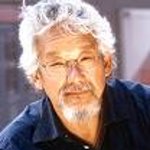By Elizabeth Willoughby on
Environmentalist, activist, scientist, David Suzuki gave his highly anticipated Legacy Lecture this month to a sold-out audience. The 73-year-old’s presentation was based on the premise, “If I had one last lecture to give, what would I say?”
His Legacy took the audience to places that have shaped Suzuki’s life, both dark and light, such as the WWII Japanese camp in British Columbia where his family was interned, to Hiroshima where his grandparents, who took the Canadian government’s one-way-ticket offer after the war, moved and died within a year, and to Haida Gwaii where Suzuki was adopted into the eagle clan.
But the talk also went into Suzuki’s long-time frustration at the political obsession for economic growth at the sacrifice of nature.
“My Prime Minister regards the economy as our highest priority,” Suzuki said, "and forgets that economics and ecology are derived from the same Greek word, oikos, meaning household or domain. Ecology is the study of home, while economics is its management. Ecologists try to define the conditions and principles that enable a species to survive and flourish. Yet in elevating the economy above those principles, we seem to think we are immune to the laws of nature. We have to put the “eco” back into economics."
Observing the effectiveness of movies to get messages to the masses, like with Leonardo DiCaprio's documentary The 11th Hour and Al Gore's An Inconvenient Truth, Suzuki, plans to take his lecture from the podium to the big screen as well, but in a more optimistic way.
“To me, at the end of [those] films you want to go out and slash your throat,” Suzuki said in a Globe and Mail report. “So I thought there had to be a way to lift people up and inspire them rather than point out how hopeless it is.”
The Legacy Lecture feature documentary should be released next autumn.
Copyright © 2009 Look to the Stars






